Tolerance Feature Descriptions
Tolerance Advisor recognizes the following features:
Single Surface Features
A single-surface feature is a feature consisting of a single surface that has no opposed points and cannot be considered a feature of size.
A feature of size must have opposing elements, so an insubstantial cylinder, cone, or sphere cannot be considered a feature of size. See ASME Y14.5-2009, par 1.3.17, or ISO 14660-1.
| Feature Type | Example | Description | Datum Feature? |
|---|---|---|---|
| Planar Surface |  | A single planar surface | Yes |
| Cylindrical Surface |  | An insubstantial (≤ 180°) internal or external cylindrical surface | No |
| Conical Surface |  | An insubstantial (≤ 180°) internal or external conical surface | No |
| Spherical Surface |  | An insubstantial internal or external spherical surface | No |
| Revolved Surface | 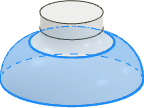 | An internal or external surface of revolution that is not cylindrical, conical, or spherical | No |
| Extruded Surface | 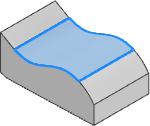 | A surface of extrusion | No |
| General Surface | 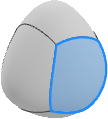 | A general doubly curving surface | No |
Single Surface Features of Size
A single-surface feature of size consists of a single surface with opposed points and is characterized by a size dimension applied to the entire surface or a circular element on the surface. In some cases it can be two or more complementary surfaces. For example, a hole feature may be represented in the model by two semi-cylindrical surfaces that function as cylindrical surface with opposed points and is characterized by a size dimension.
Regular Feature of Size per ASME Y14.5-2009, par. 1.3.32.1: One cylindrical or spherical surface, a circular element, and a set of two opposed parallel elements or opposed parallel surfaces, each of which is associated with a directly toleranced dimension.
| Feature Type | Example | Description | Datum Feature? | |
|---|---|---|---|---|
| Surface Features of Size | Simple Hole |  | A substantial (>180°) internal cylindrical surface | Yes |
| Shaft |  | A substantial (>180°) external cylindrical surface | Yes | |
| Ball |  | A substantial external spherical surface | No | |
| Socket | 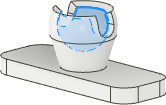 | A substantial internal spherical surface | No | |
| Circular Element Features of Size | Tapered Hole | 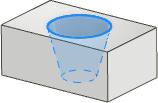 | A substantial (>180°) internal conical surface | Yes - Note 1 |
| Tapered Shaft | 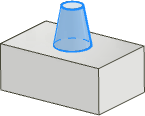 | A substantial (>180°) external conical surface | Yes - Note 1 | |
Multi-Surface Features of Size
A multi-surface feature of size consists of multiple related model surfaces that are associated with one or more size dimensions.
| Feature Type | Example | Description | Datum Feature? | |
|---|---|---|---|---|
| Special Hole Features | Blind Hole |  | A simple hole with a flat planar depth | Yes - Note 2 |
| Drilled Hole |  | A simple hole with a conical depth | Yes - Note 2 | |
| Multi-Element Hole |  | A simple hole, blind hole, or drilled hole with one or more additional elements: counterbore, countersink, and/or thread | Yes - Note 2 | |
| Straight Multi-Surface Features of Size | Slab |  | Externally opposed, overlapping parallel planes | Yes |
| Slot |  | Internally opposed, overlapping parallel planes | Yes | |
| Slotted Hole |  | Opposed planes with cylindrical tangent end caps | Yes - Note 4 | |
| Tapered Multi-Surface Features of Size | Tapered Slab | 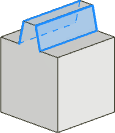 | Externally opposed, overlapping tapered planes centered on a mid-plane | Yes - Note 3 |
| Tapered Slot | 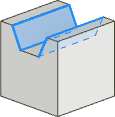 | Internally opposed, overlapping tapered planes centered on a mid-plane | Yes - Note 3 | |
| Tapered Slotted Hole | 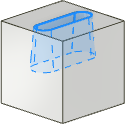 | Opposed tapered planes with conical tangent end caps | Yes - Note 5 | |
Multi-Surface Features
A multi-surface group consists of two or more surfaces that cannot be considered a multi-surface feature of size (as described above).
| Feature Type | Example | Description | Datum Feature? |
|---|---|---|---|
| Coplanar Group |  | Two or more aligned, coplanar planes | Yes |
| Planar Group | 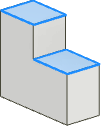 | Two or more parallel planar surfaces that are not aligned and coplanar | No |
| Cocylindrical Group | 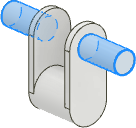 | Two or more simple holes or two or more shafts that are the same size and are coaxial | Yes |
| Cylindrical Group | 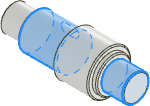 | Two or more simple holes or two or more shafts that are coaxial but not the same size | No |
| Extruded Group | 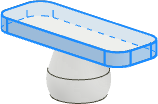 | Two or more surfaces that form a feature of extrusion (one translational direction of symmetry) | No |
| Revolved Group | 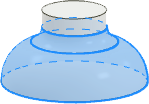 | Two or more surfaces that form a feature of revolution (one rotational direction of symmetry) | No |
| General Group | 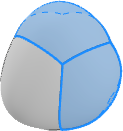 | Two or more surfaces that form a general feature with no directions of symmetry | No |
Datum feature notes:
- Datum feature is assumed to be the gage circle of the feature. This datum feature may not be referenced as a primary datum feature in a feature control frame (unless used in conjunction with another coaxial datum feature to define a multiple datum feature, for example, A-B). May only be referenced in a feature control frame if one of the higher-precedence datum features is a plane that is normal to the feature axis.
- Datum feature is assumed to be the main hole feature. Other feature surfaces are ignored.
- Datum feature is assumed to be the opposing line elements on the gage plane of the feature. This datum feature may not be referenced as a primary datum feature in a feature control frame. May only be referenced in a feature control frame if one of the higher-precedence datum features is a plane that is normal to the feature mid-plane.
- Datum feature is assumed to be the opposing parallel planes. The cylindrical end caps are ignored.
- Datum feature is assumed to be the opposing line elements on the gage plane of the feature. The conical end caps are ignored. This datum feature may not be referenced as a primary datum feature in a feature control frame. May only be referenced in a feature control frame if one of the higher-precedence datum features is a plane that is normal to the feature mid-plane.